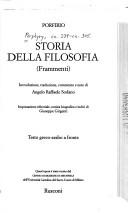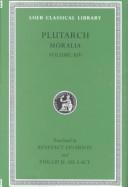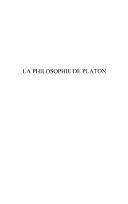| Listing 1 - 10 of 2935 | << page >> |
Sort by
|
Book
ISBN: 9782503568553 2503568556 Year: 2019 Publisher: Turnhout Brepols Publishers
Abstract | Keywords | Export | Availability | Bookmark
 Loading...
Loading...Choose an application
- Reference Manager
- EndNote
- RefWorks (Direct export to RefWorks)
Philosophy has never been an obvious life choice, especially in the absence of apparent practical usefulness. The intellectual effort and moral discipline it exacts appeared uninviting “from the outside.” However, the philosophical ideals of theoretical precision and living virtuously are what has shaped the cultural landscape of the West since Antiquity. This paradox arose because the ancients never confined their philosophy to the systematic exposition of doctrine. Orations, treatises, dialogues and letters aimed at persuading people to become lovers of wisdom, not metaphorically, but truly and passionately. Rhetorical feats, logical intricacies, or mystical experience served to recruit adherents, to promote and defend philosophy, to support adherents and guide them towards their goal. Protreptic (from the Greek, “to exhort,” “to convert”) was the literary form that served all these functions. Content and mode of expression varied considerably when targeting classical Greek aristocracy, Hellenistic schoolrooms or members of the early Church where the tradition of protreptic was soon appropriated. This volume seeks to illuminate both the diversity and the continuity of protreptic in the work of a wide range of authors, from Parmenides to Augustine. The persistence of the literary form bears witness to a continued fascination with the call of wisdom.
Book
ISBN: 3111451267 Year: 2016 Publisher: Berlin ; Boston : De Gruyter, Georg Andreas Reimer Verlag,
Abstract | Keywords | Export | Availability | Bookmark
 Loading...
Loading...Choose an application
- Reference Manager
- EndNote
- RefWorks (Direct export to RefWorks)
Book
ISBN: 9004663606 Year: 1951 Publisher: Leiden ; Boston : Brill,
Abstract | Keywords | Export | Availability | Bookmark
 Loading...
Loading...Choose an application
- Reference Manager
- EndNote
- RefWorks (Direct export to RefWorks)
Book
ISBN: 900467439X Year: 1959 Publisher: Leiden ; Boston : Brill,
Abstract | Keywords | Export | Availability | Bookmark
 Loading...
Loading...Choose an application
- Reference Manager
- EndNote
- RefWorks (Direct export to RefWorks)

ISBN: 8818701908 9788818701906 Year: 1997 Volume: 45 Publisher: Milano Rusconi
Abstract | Keywords | Export | Availability | Bookmark
 Loading...
Loading...Choose an application
- Reference Manager
- EndNote
- RefWorks (Direct export to RefWorks)

ISBN: 0674994728 Year: 1967 Publisher: Cambridge, MA : Harvard University Press,
Abstract | Keywords | Export | Availability | Bookmark
 Loading...
Loading...Choose an application
- Reference Manager
- EndNote
- RefWorks (Direct export to RefWorks)
Plutarch (Plutarchus), ca. 45-120 CE, was born at Chaeronea in Boeotia in central Greece, studied philosophy at Athens, and, after coming to Rome as a teacher in philosophy, was given consular rank by the emperor Trajan and a procuratorship in Greece by Hadrian. He was married and the father of one daughter and four sons. He appears as a man of kindly character and independent thought, studious and learned. Plutarch wrote on many subjects. Most popular have always been the 46 Parallel Lives, biographies planned to be ethical examples in pairs (in each pair, one Greek figure and one similar Roman), though the last four lives are single. All are invaluable sources of our knowledge of the lives and characters of Greek and Roman statesmen, soldiers and orators. Plutarch's many other varied extant works, about 60 in number, are known as the Moralia or Moral Essays. They are of high literary value, besides being of great use to people interested in philosophy, ethics and religion. The Loeb Classical Library edition of the Moralia is in fifteen volumes, Volume XIII having two parts.
Book
ISBN: 0521055784 9780521055789 Year: 1977 Publisher: Cambridge Cambridge University press
Abstract | Keywords | Export | Availability | Bookmark
 Loading...
Loading...Choose an application
- Reference Manager
- EndNote
- RefWorks (Direct export to RefWorks)
Book
ISSN: 00791687 ISBN: 9789004428386 9004428380 9004428402 Year: 2020 Volume: 153 Publisher: Leiden ; Boston : Brill,
Abstract | Keywords | Export | Availability | Bookmark
 Loading...
Loading...Choose an application
- Reference Manager
- EndNote
- RefWorks (Direct export to RefWorks)
A new reconstruction and text of the Placita of Aëtius (ca. 50 CE), accompanied by a full commentary and an extensive collection of related texts. This compendium, arguably the most important doxographical text to survive from antiquity, is known through the intensive use made of it by authors in later antiquity and beyond. Covering the entire field of natural philosophy, it has long been mined as a source of information about ancient philosophers and their views. It now receives a thorough analysis as a remarkable work in its own right. This volume is the culmination of a five-volume set of studies on Aëtius (1997–2020): Aëtiana I (ISBN: 9789004105805, 1996), II (Parts 1&2; set ISBN 9789004172067; 2008), III (ISBN 9789004180413; 2009), IV (ISBN: 9789004361454, 2018), and V (Parts 1-4). It uses an innovative methodology to replace the seminal edition of Hermann Diels (1879).

ISBN: 2747582647 9782747582643 Year: 2005 Publisher: Paris L'Harmattan
Abstract | Keywords | Export | Availability | Bookmark
 Loading...
Loading...Choose an application
- Reference Manager
- EndNote
- RefWorks (Direct export to RefWorks)
Book
ISBN: 1942495471 1942495463 Year: 2022 Publisher: Dunes : Parnassos Press - Fonte Aretusa,
Abstract | Keywords | Export | Availability | Bookmark
 Loading...
Loading...Choose an application
- Reference Manager
- EndNote
- RefWorks (Direct export to RefWorks)
Arete is a central yet elusive concept in ancient Greek culture. Traditionally associated with the strength and skill of heroes, warriors and athletes, arete evolved over the course of ancient Greek history to become a primary focus of ethical and political reflection and debate. For ancient Greek philosophy, arete (traditionally translated as "virtue") was the essential object of human admiration and striving, and even the key to happiness. Despite this shared conception, deep disagreements persisted among ancient thinkers about what exactly arete is, who has it, and why it is so valuable. A companion volume, Ageless Arete, provides a broad overview of the diverse roles played by arete in ancient Greece and Rome. The present volume, Arete in Plato and Aristotle, offers a focused exploration of perhaps the two most innovative and influential contributors to ancient philosophical debates about arete. Plato and Aristotle took the concept of arete as the starting point for investigations of the human soul, the good life, the nature of knowledge, the goals of education, and the role of politics and culture in nurturing human excellence. Their work continues to inspire reflection on these fundamental questions today, as the fourteen new essays collected here demonstrate.
| Listing 1 - 10 of 2935 | << page >> |
Sort by
|

 Search
Search Feedback
Feedback About
About Help
Help News
News